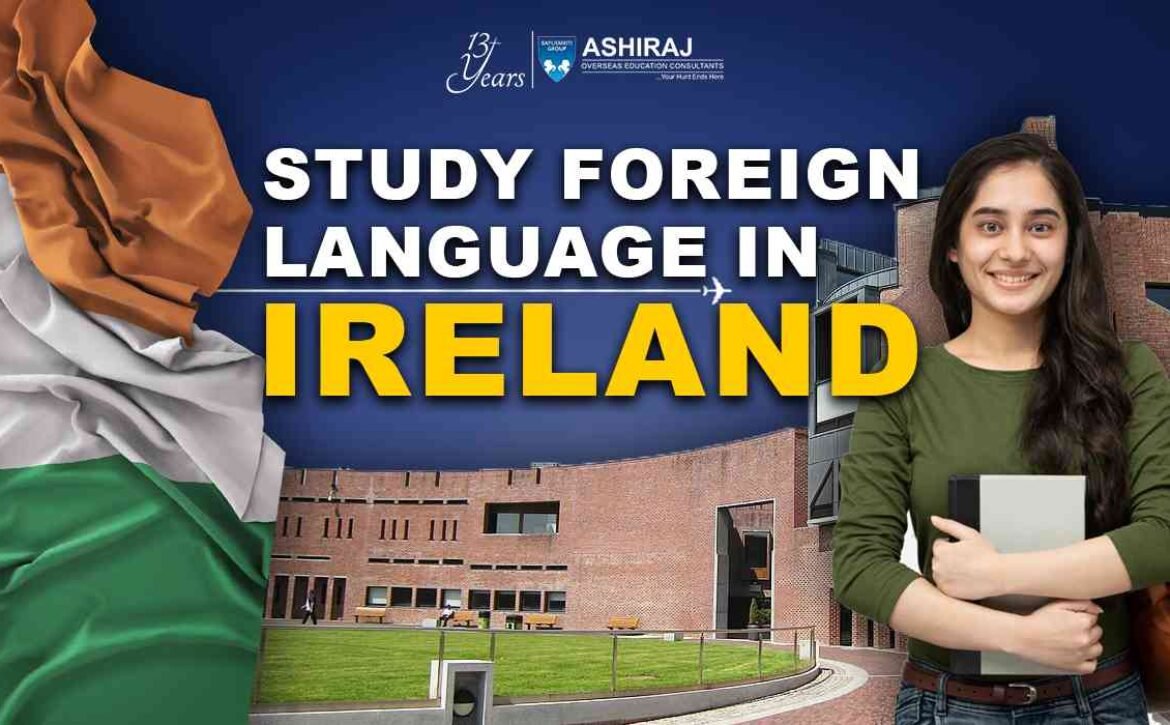
Foreign Language in Ireland
Foreign Language in Ireland is a dynamic aspect of the country’s cultural landscape, reflecting its global connections and diverse population. Ireland, historically renowned for its native Gaelic language, has increasingly embraced foreign languages in recent years due to globalization and immigration. With the rise of multinational companies and increased tourism, proficiency in languages such as English, Spanish, French, and German has become valuable in both professional and social spheres.
Moreover, Ireland’s educational system places a significant emphasis on foreign language learning from an early age, with most schools offering programs in multiple languages. This commitment to language education not only enhances Ireland’s competitiveness in the global economy but also fosters greater cultural understanding and appreciation. As Ireland continues to evolve as a multicultural society, the importance of foreign languages in daily life, business, and education will undoubtedly continue to grow. Foreign Language in Ireland represents a bridge to the world, enriching the nation’s connections and perspectives in an increasingly interconnected global community.
Why Study Foreign Language in Ireland?
- Global Opportunities: Ireland’s economy is increasingly globalized, offering numerous opportunities for individuals fluent in foreign languages to work in multinational companies and industries.
- Enhanced Employability: Proficiency in a foreign language significantly enhances your employability in Ireland’s competitive job market, giving you an edge over monolingual candidates.
- Cultural Exchange: Learning a foreign language in Ireland opens doors to rich cultural exchanges, allowing you to interact with people from diverse linguistic and cultural backgrounds.
- Education: Ireland’s education system places a strong emphasis on foreign language learning, providing access to quality language programs and resources from an early age.
- Travel and Tourism: Speaking a foreign language makes traveling within Ireland and abroad more enriching and enjoyable, enabling you to communicate effectively and immerse yourself in different cultures.
- Personal Growth: Studying a foreign language fosters personal growth by improving cognitive skills, such as problem-solving, critical thinking, and multitasking.
- Networking Opportunities: Language proficiency facilitates networking and building relationships with people from around the world, expanding your social and professional circles.
- Global Citizenship: Being proficient in a foreign language in Ireland promotes global citizenship, fostering greater understanding, tolerance, and appreciation for diverse perspectives and cultures.
In conclusion, studying a foreign language in Ireland opens doors to a multitude of opportunities, enriching your personal and professional life while contributing to Ireland’s position in the global community. Foreign Language in Ireland is not just a skill but a gateway to broader horizons and deeper connections in an increasingly interconnected world.
Top Universities to Study Foreign Language in Ireland
University | QS World University Rankings 2023 | Type of University | Average Annual Fees | Programs Offered |
Trinity College Dublin | 80 | Public | €6,000 – €25,000 | – Bachelor of Arts in Modern Languages |
– Master of Arts in Applied Linguistics | ||||
– PhD in Linguistics and Language Studies | ||||
University College Dublin | 98 | Public | €6,000 – €25,000 | – BA in Modern Languages |
– MA in Translation Studies | ||||
– PhD in Applied Linguistics and Translation Studies | ||||
National University of | 150 | Public | €6,000 – €20,000 | – BA in Languages and Linguistics |
Ireland Galway | – MA in Languages and Cultures | |||
– PhD in Applied Linguistics | ||||
University College Cork | 160 | Public | €6,000 – €22,000 | – BA in Languages, Literature, and Cultures |
– MA in Translation Studies and Comparative Literature | ||||
– PhD in Modern Languages and Applied Linguistics | ||||
Dublin City University | 220 | Public | €5,000 – €20,000 | – BA in Applied Language and Intercultural Studies |
– MA in Translation Studies | ||||
– PhD in Language and Intercultural Studies |
Studying foreign languages in Ireland offers a plethora of options, especially in its top universities. Here’s a concise breakdown of the top 5 universities in Ireland for foreign language studies based on QS World University Rankings 2023 and their respective programs and fees. Trinity College Dublin, University College Dublin, National University of Ireland Galway, University College Cork, and Dublin City University offer diverse programs ranging from Bachelor’s to Ph.D. levels. These universities provide comprehensive language studies, including linguistics, translation studies, and cultural studies, among others. Foreign Language in Ireland is not only about learning the language but also delving deep into its cultural, historical, and societal aspects. With moderate to affordable annual fees, these universities make foreign language education accessible to a wide range of students, contributing to Ireland’s reputation as a hub for language learning and cultural exchange.
Course Curriculum for Foreign Language in Ireland
- Language Proficiency: The course curriculum of Foreign Language in Ireland emphasizes achieving proficiency in the target language through immersive learning experiences.
- Cultural Studies: Students explore the cultural nuances and traditions associated with the language they are studying, gaining insights into the socio-cultural contexts where the language is spoken.
- Linguistics: The curriculum delves into the linguistic aspects of the language, including phonetics, syntax, semantics, and pragmatics, to develop a comprehensive understanding of its structure and usage.
- Literature and Media: Students analyze literature, films, and other media in the target language, enhancing their comprehension skills and cultural appreciation.
- Translation and Interpretation: The curriculum often includes courses on translation and interpretation, equipping students with the skills to bridge language barriers in various professional settings.
- Language Teaching Methodologies: For students interested in language teaching careers, courses on language teaching methodologies provide practical strategies and techniques for effective language instruction.
- Study Abroad Opportunities: Many programs offer study abroad opportunities, allowing students to immerse themselves in the language and culture of the target country.
- Research and Thesis: At advanced levels, students may engage in research projects and thesis work, exploring specific topics in linguistics, literature, or cultural studies related to the target language.
Foreign Language in Ireland programs are designed to foster linguistic proficiency, cultural understanding, and intercultural communication skills, preparing students for diverse personal and professional opportunities in an increasingly globalized world.
Eligibility Criteria & Admission Requirements for MS in Foreign Language in Ireland
- IELTS or TOEFL Scores:
IELTS: Minimum score of 6.5 overall, with no individual band score below 6.0.
TOEFL: Minimum score of 90 on the internet-based test (iBT), with a minimum score of 20 in each section.
- GRE or GMAT Scores:
GRE:
Not mandatory for most language programs but may be required for advanced degree programs. Typically, a competitive score ranges from 155-165 for Verbal Reasoning and 4.0-5.0 for Analytical Writing.
GMAT: Usually not required for language programs but may be necessary for business or management-related courses. A competitive score is typically around 600-700.
Eligibility Criteria | Marks |
IELTS | 6.5 (Overall), 6.0 (Minimum in each band) |
TOEFL | 90 (iBT), 20 (Minimum in each section) |
GRE Verbal Reasoning | 155-165 |
GRE Analytical Writing | 4.0-5.0 |
GMAT | 600-700 |
- Passport & Student Visa: A valid passport and a student visa are required for international students studying foreign languages in Ireland.
- Academic Certificates: Applicants must provide transcripts and certificates demonstrating their academic qualifications, typically including high school diplomas and any relevant higher education degrees.
- Work Experience: While not always mandatory, some programs may require or prefer applicants to have relevant work experience, especially for advanced degree programs or professional courses.
Meeting the eligibility criteria for Foreign Language in Ireland ensures that students have the necessary language proficiency, academic background, and documentation to pursue their studies effectively and seamlessly integrate into the Irish educational system. Foreign Language in Ireland programs welcome students from diverse backgrounds and provide opportunities for personal and academic growth in a multicultural environment.
Documents Required for Studying Foreign Language in Ireland
- Passport: A valid passport is essential for international students applying to study Foreign Language in Ireland, with a minimum validity period specified by the university or immigration authorities.
- Two Letters of Recommendation (LOR): LORs from academic or professional referees attesting to the applicant’s character, academic abilities, and suitability for the program are typically required.
- Statement of Purpose (SOP): An SOP detailing the applicant’s academic background, career goals, reasons for choosing the program, and how it aligns with their aspirations is necessary for admission consideration.
- Curriculum Vitae (CV): A comprehensive CV outlining the applicant’s educational qualifications, work experience, extracurricular activities, achievements, and skills is typically required.
- Official High School Transcripts and Educational Certificates: Applicants must submit official transcripts and certificates from their high school or equivalent educational institutions, demonstrating their academic achievements and qualifications.
- Work Experience Certificate: If applicable, a certificate documenting relevant work experience is required, especially for applicants pursuing advanced or professional language programs.
- Proof of Financial Resources: Evidence of sufficient financial resources to cover tuition fees, living expenses, and other costs associated with studying and living in Ireland is mandatory for obtaining a student visa.
Ensuring the submission of these documents is crucial for a successful application to study Foreign Language in Ireland. Adhering to the specified requirements demonstrates the applicant’s readiness and commitment to pursuing their academic goals in Ireland.
Admission Process for Foreign Language in Ireland
- Research Programs: Explore the various language programs offered by universities in Ireland, considering factors such as curriculum, faculty expertise, and campus facilities.
- Check Eligibility Criteria: Review the admission requirements for each program, including language proficiency tests, academic qualifications, and any additional documentation needed.
- Prepare Required Documents: Gather necessary documents such as transcripts, certificates, letters of recommendation, statement of purpose, CV, passport, and proof of financial resources.
- Language Proficiency Test: Take the required language proficiency test, such as IELTS or TOEFL, and achieve the minimum scores specified by the university.
- Submit Application: Complete the online application form provided by the university, ensuring accurate and timely submission of all required documents.
- Pay Application Fee: Pay the application fee as per the university’s instructions to initiate the evaluation process.
- Wait for Admission Decision: Await the university’s decision on your application, which may take several weeks. Some programs may require interviews or additional assessments.
- Receive Offer Letter: Upon acceptance, you will receive an offer letter from the university outlining the terms of admission, including tuition fees, deadlines, and any conditions to fulfill.
- Accept Offer and Pay Deposit: Confirm your acceptance of the offer by paying the required deposit within the stipulated timeframe to secure your place in the program.
- Apply for Student Visa: Once you receive the acceptance letter, apply for a student visa from the Irish embassy or consulate in your home country, providing all necessary documents and fulfilling visa requirements.
Following these steps diligently ensures a smooth and successful admission process for studying Foreign Language in Ireland. Foreign Language in Ireland programs welcome students from around the world, fostering cultural exchange and academic excellence in a vibrant and inclusive environment.
“Education is the most powerful weapon which you can use to change the world.”
Nelson Mandela
Cost of Foreign Language Course in Ireland
- Tuition Fees: The cost of tuition for Foreign Language in Ireland programs varies depending on the university, program level, and duration. On average, international students’ tuition fees range from €6,000 to €25,000 per year.
- Accommodation: Accommodation expenses can vary based on location, type of accommodation, and amenities. Options include university dormitories, private rentals, or homestays. On-campus accommodation typically costs between €4,000 to €8,000 per year.
- Living Expenses: Living expenses in Ireland, including food, transportation, utilities, and entertainment, can amount to approximately €10,000 to €12,000 per year, depending on the student’s lifestyle and spending habits.
- Health Insurance: International students are required to have health insurance coverage while studying in Ireland. The cost of health insurance varies but is typically around €300 to €500 per year.
- Books and Supplies: Budget for textbooks, stationery, and other academic materials, which may amount to approximately €500 to €1,000 per year.
- Miscellaneous Expenses: Include additional costs such as visa fees, travel expenses, and personal expenses, which can vary depending on individual circumstances.
Overall, the cost of studying Foreign Language in Ireland is influenced by various factors, and students should carefully budget and plan their finances to ensure a comfortable and fulfilling academic experience. Foreign Language in Ireland programs offer valuable opportunities for language learning and cultural immersion in a vibrant and welcoming environment, making it a worthwhile investment for students seeking linguistic proficiency and global experiences.
Scholarships for Foreign Language Courses in Ireland
Scholarship Name | Amount | Application Deadline |
Government of Ireland | €5,000 – €10,000 | Varies (Usually April) |
per year | ||
Irish Research Council | €16,000 – €25,000 | Varies (Usually March) |
Postgraduate Scholarship | per year | |
University Scholarships | €2,000 – €5,000 | Varies (Usually May) |
per year | ||
Language Department | €1,000 – €3,000 | Varies (Usually June) |
Scholarships | per year | |
Merit-Based Scholarships | €3,000 – €8,000 | Varies (Usually July) |
per year |
Scholarships for Foreign Language in Ireland offer financial assistance to students pursuing language studies at various levels. The Government of Ireland Scholarship provides support ranging from €5,000 to €10,000 per year, with application deadlines typically falling in April. The Irish Research Council offers prestigious Postgraduate Scholarships worth €16,000 to €25,000 annually, with application deadlines usually in March. Additionally, universities in Ireland offer their scholarships, with amounts ranging from €2,000 to €5,000 per year and application deadlines in May. Language Department Scholarships provide €1,000 to €3,000 per year, with deadlines typically in June. Merit-based scholarships, offering €3,000 to €8,000 per year, have application deadlines in July. These scholarships alleviate financial burdens and enable students to focus on their academic pursuits in Foreign Language in Ireland programs, fostering linguistic proficiency and cultural exchange.
Career Opportunities After Foreign Language in Ireland
Job Profile | Average Salary (per year) |
Language Teacher | €30,000 – €45,000 |
Translator/Interpreter | €25,000 – €40,000 |
Localization Specialist | €35,000 – €50,000 |
International Relations | €40,000 – €60,000 |
Specialist | |
Foreign Correspondent | €35,000 – €55,000 |
After completing a program in Foreign Language in Ireland, graduates have various career opportunities available to them. Language teachers are in demand in schools, language institutes, and private tutoring centers, with salaries ranging from €30,000 to €45,000 per year. Translators and interpreters work in diverse industries such as government agencies, multinational corporations, and media outlets, earning between €25,000 and €40,000 annually. Localization specialists, responsible for adapting content for global audiences, earn salaries ranging from €35,000 to €50,000 per year. Those pursuing careers in international relations specialize in diplomacy, trade, and cultural exchange, with average salaries ranging from €40,000 to €60,000 annually. Foreign correspondents report on international events for media organizations, earning salaries between €35,000 and €55,000 per year. These career opportunities showcase the versatility and value of acquiring proficiency in foreign languages, opening doors to diverse and rewarding professional paths in Ireland and beyond.
Frequently Asked Questions About Foreign Language in Ireland
Yes, many universities in Ireland offer foreign language programs with English as the medium of instruction. However, proficiency in English is typically required for admission.
You can study various foreign languages in Ireland, including French, German, Spanish, Italian, Chinese, Japanese, and many more, depending on the offerings of the universities.
It depends on the university and program requirements. Some programs may require language proficiency tests, while others may not.
Yes, there are scholarships available for international students studying foreign languages in Ireland. These scholarships may be offered by the government, universities, or private organizations.
Job prospects include language teaching, translation, interpretation, international relations, localization, and journalism, among others.
Yes, international students can work part-time during term and full-time during holidays, subject to certain restrictions and visa regulations.
The duration of programs varies depending on the level and intensity of study. It can range from one year for a diploma to four years for a bachelor’s degree.
No, many programs offer courses for beginners as well as advanced learners. However, some programs may have prerequisites or placement tests.
It depends on the university and program offerings. Some universities may allow you to study multiple languages concurrently.
You can apply for a student visa through the Irish Naturalisation and Immigration Service (INIS) website, following the specific visa requirements for your country of origin and the program you’ve been accepted into.




